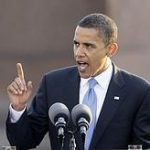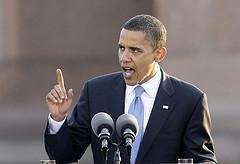The Obama administration faces a huge contradiction in trying to craft a new policy for the Middle East in the midst of the Arab Spring.

Obama faces his own contractions with today’s speech (Photo by Matt Ortega)
They are trying to position the U.S. as a friend of the newly democratizing forces, while at the same time refusing to give up the policy of support for those on top, who imposed dictatorships and occupations across the Middle East, to protect U.S. interests in oil, Israel, and strategic stability. Now it is the people of the region who are creating new democracies from below – and it is long past time to change how the U.S. relates to them.
A transformed U.S. role in the region will have to go beyond soaring words and even additional economic assistance. It will require an entirely different policy based on support for popular bottom-up democracy, acceptance of new indigenous definitions of social and economic justice, and respect for local decision-making – even when reality doesn’t match Washington’s illusion of what the “new Middle East” should look like.
What would that policy look like?
- An end to the U.S. military aid and diplomatic protection that enable Israel’s occupation and apartheid policies, and supporting regional and globally-led diplomacy rather than imposing its own failed “peace process.”
- An end to all U.S. military ties to any regime suppressing the Arab Spring protests in its own or other countries (that means Saudi Arabia as well as Bahrain, for example, as well as pulling all troops and mercenaries out of Iraq).
- An end to all economic aid until it can be redirected away from militaries (even in democratizing countries) and into the hands of accountable governments. Supporting creation of a nuclear weapons-free zone throughout the Middle East.
- An end to the double-standard of harsh sanctions and massive military force (such as in Syria and Libya) imposed against some dictators’ attacks on protestors, while continuing to arm and finance dictatorships strategically allied with the U.S. (such as Bahrain and Yemen) with hardly a word of protest against their lethal assaults on unarmed demonstrators.
